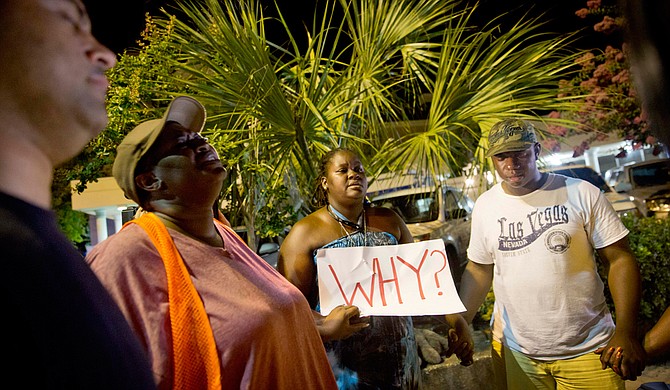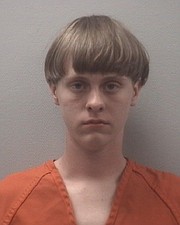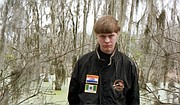Surreace Cox, of North Charleston, S.C., holds a sign during a prayer vigil down the street from the Emanuel AME Church early Thursday, June 18, 2015, following a shooting Wednesday night in Charleston, S.C. Photo courtesy Associated Press/David Goldman
CHARLESTON, S.C. (AP) — A white man who joined a prayer meeting inside a historic black church and then fatally shot nine people was captured without resistance Thursday after an all-night manhunt, Charleston's police chief said.
Dylann Storm Roof, 21, spent nearly an hour inside the church Wednesday night before killing six women and three men, including the pastor. A citizen spotted his car in Shelby, North Carolina, and tipped police, Chief Greg Mullen said.
The chief wouldn't discuss a motive. Charleston Mayor Joseph P. Riley Jr. called it "pure, pure concentrated evil." Stunned community leaders and politicians condemned the attack on The Emanuel African Methodist Episcopal Church, and Attorney General Loretta Lynch said the Justice Department has begun a hate crime investigation.
President Barack Obama, who personally knew the slain pastor, state Sen. Clementa Pinckney, said these shootings have to stop.
"At some point, we as a country will have to reckon with the fact that this type of mass violence does not happen in other advanced countries," Obama said.
Pinckney, 41, was a married father of two who became the youngest member of the South Carolina state House when he was elected as a Democrat at 23.
"He never had anything bad to say about anybody, even when I thought he should," State House Minority leader Todd Rutherford told The Associated Press. "He was always out doing work either for his parishioners or his constituents. He touched everybody."
Roof's childhood friend, Joey Meek, alerted the FBI after recognizing him in a surveillance camera image, said Meek's mother, Kimberly Konzny. Roof had worn the same sweatshirt while playing Xbox videogames in their home recently.
"I don't know what was going through his head," Konzny said. "He was a really sweet kid. He was quiet. He only had a few friends."
Roof had been to jail: State court records show a pending felony drug case against him, and a past misdemeanor trespassing charge.
He also displayed the flags of defeated white-ruled regimes: a Confederate flag was on his license plate, Konzny said, and a photo on his Facebook page shows him wearing a jacket with stitched-on flag patches from Rhodesia and apartheid-era South Africa.
The shooting evoked painful memories of other attacks. Black churches were bombed in the 1960s when they served as organizing hubs for the Civil Rights movement, and burned by arsons across the South in the 1990s. Others survived shooting sprees.
This particular congregation, which formed in 1816, has its own grim history: A founder, Denmark Vesey, was hanged after trying to organize a slave revolt in 1822, and white landowners burned the church in revenge, leaving parishioners to worship underground until after the Civil War.
This shooting "should be a warning to us all that we do have a problem in our society," said state Rep. Wendell Gilliard, a Democrat whose district includes the church. "There's a race problem in our country. There's a gun problem in our country. We need to act on them quickly."
"Of all cities, in Charleston, to have a horrible hateful person go into the church and kill people there to pray and worship with each other is something that is beyond any comprehension and is not explained," Riley said. "We are going to put our arms around that church and that church family."
NAACP President and CEO Cornell William Brooks said "there is no greater coward than a criminal who enters a house of God and slaughters innocent people."
A few bouquets of flowers tied to a police barricade outside the church formed a small but growing memorial.
"Today I feel like it's 9-11 again," Bob Dyer, who works in the area, said after leaving an arrangement of yellow flowers wrapped in plastic. "I'm in shock."
Charleston residents Samuel Ward and Evangeline Simmons stood silently at the barricade with arms around each other. Simmons belongs to another AME congregation, and said "It's like it's just trying to strip away part of your faith ... But it just makes you stronger."
The attack came two months after the fatal shooting of an unarmed black man, Walter Scott, by a white police officer in neighboring North Charleston that sparked major protests and highlighted racial tensions in the area. The officer awaits trial for murder, and the shooting prompted South Carolina lawmakers to push through a bill helping all police agencies in the state get body cameras. Pinckney was a sponsor of that bill.
"I am very tired of people telling me that I don't have the right to be angry," Community organizer Christopher Cason said. "I am very angry right now."
Copyright Associated Press. All rights reserved. This material may not be published, broadcast, rewritten, or redistributed.





Comments
Use the comment form below to begin a discussion about this content.